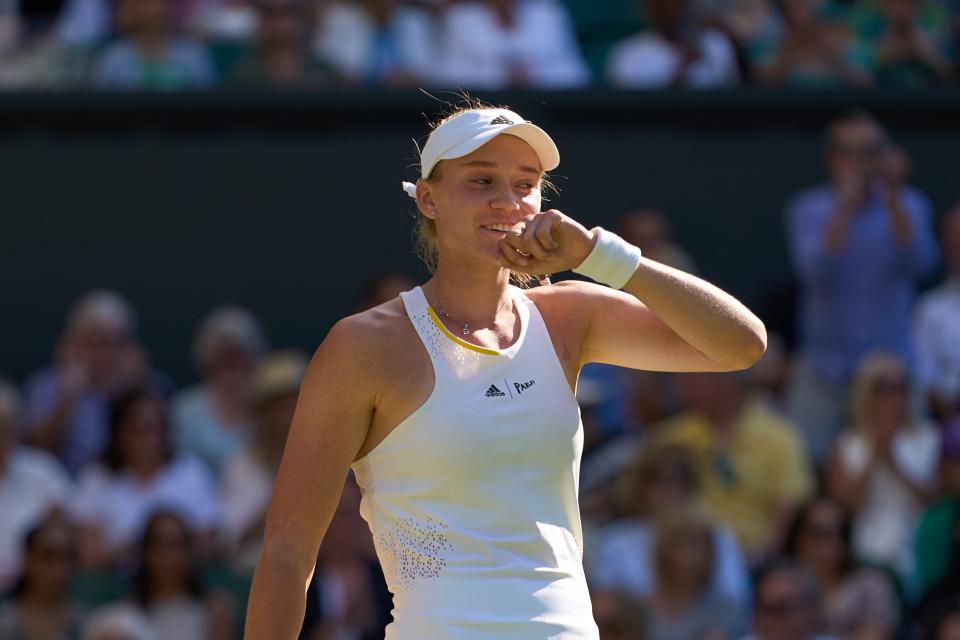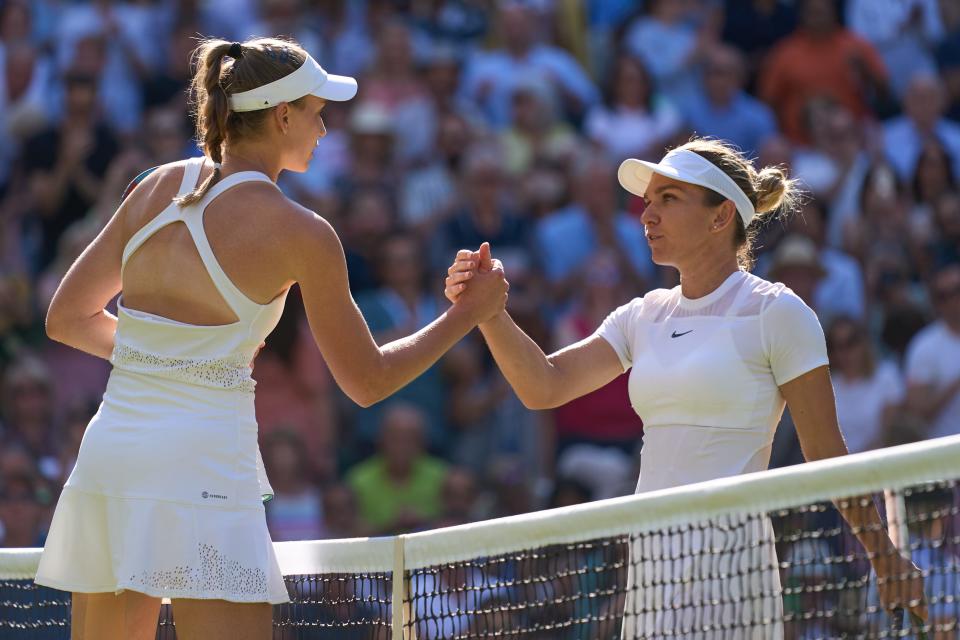Wimbledon's misguided ban on Russians didn't account for finalist Elena Rybakina | Opinion
- Oops!Something went wrong.Please try again later.
- Oops!Something went wrong.Please try again later.
- Oops!Something went wrong.Please try again later.
- Oops!Something went wrong.Please try again later.
Almost soon as Wimbledon announced it would ban Russian and Belarusian tennis players from this year’s tournament — a measure adopted by none of the other Grand Slams and condemned by the men's and women’s pro tours — smart observers of the All England Club suggested one factor might have been fear of a British royal family member having to hand the trophy to Daniil Medvedev or Aryna Sabalenka while Vladimir Putin’s awful invasion of Ukraine rages on.
As it turns out, the policy — well-intentioned as it might be — wasn't exactly rock solid. Because on Saturday, there’s a very good chance that the Venus Rosewater Dish will indeed go to a Russian.
It just so happens that 23-year-old Elena Rybakina, who will play Ons Jabeur in the women’s final, made a fateful decision in 2018 that allowed her to be here, so close to winning the most famous tournament in the world.
Rybakina was born in Moscow. She grew up in Moscow. When she won her first professional title — a small tournament in Kazan, Russia — she represented her home country.

SPORTS NEWSLETTER: Sign up now to get daily updates in your inbox
WIMBLEDON: Rafael Nadal withdraws from semifinals because of abdominal tear
But at age 19, Rybakina was at a career crossroads. Like many tennis players trying to break into the top level of the sport, she needed financial assistance for training and travel and wasn’t getting it from the Russian tennis federation. Another option was going to college in the U.S., which her father favored.
Instead, here came oil-rich Kazakhstan with an offer she couldn’t refuse: In exchange for switching her citizenship and playing under the Kazakh flag, she would receive the support she needed for facilities and coaching to take the next step in her career.
“They believed in me and they offered,” Rybakina told the WTA’s Web site in early 2020. “I was not so good when they offered. So they believed in me and they're helping me a lot.”
This isn’t unusual for Russian players. Yulia Putinseva, a longtime fixture in the top 50, made the same decision in 2012. Well-known men's players Alexander Bublik, Mikhail Kukushkin and Andrey Golubev have also done the Russia-to-Kazakhstan citizenship swap for dollars.
As Golubev discussed in a 2012 interview, it’s a mutually beneficial relationship without many strings attached. Kazakhstan can promote tennis stars, help grow the sport at home and be represented on the international stage in the Olympics or team events like the Davis Cup. The players get money and a new passport but don’t even have to live in Kazakhstan.
Rybakina, whose home remains in Moscow, has been by far the biggest success story for the Kazakh tennis project. Though she had already risen to the top 30, many first took notice of her ability last year at the French Open when she beat Serena Williams in the fourth round. At 6 feet tall with a huge serve and powerful groundstrokes, it was only a matter of time before she had a big breakthrough in a Grand Slam.
By the letter of the rule, Rybakina had every right to play in this Wimbledon. When she became a citizen of Kazakhstan four years ago, she sufficiently qualified. But the fact that she might win this tournament underscores how nonsensical it was in the first place for the All England Club to draw a red line based on nationality because of a war that the players have no control over.
It's one thing to ban countries from international competition, where the accomplishment and the glory is expressly tied to nationalism. But professional tennis is ultimately about the individual, and Rybakina is an example of how fungible and often irrelevant the country designations can be.
Rybakina might hold a Kazakh passport, but is she more or less Russian than Medvedev, who moved to France at a young age to train and formally resides in Monaco? Or what about Vika Azarenka, who grew up in Belarus but has lived the majority of her life in the United States and whose son was born here? What about Andrey Rublev, who wrote "No War Please” on a camera lens after a match?
In the big picture, it’s downright bizarre that they weren't allowed to play while Rybakina — who chose Kazakhstan for financial reasons, not ideological — is one win from the title. Asked after her quarterfinal if she felt more Russian or Kazakh, at least she was honest: “It's a tough question.”

The whole situation underscores how identity and nationality and support for a particular government are not always as easy or clean as the Wimbledon ban would make it seem. It's also clear it wasn't going to make one bit of difference in anything Putin has been doing with regard to Ukraine. If anything, it only handed him more propaganda to spread at home, helping him make the case that Russians are being discriminated against by the rest of the world.
Perhaps Wimbledon officials thought that other tournaments would follow their lead, but the rest of the tennis world showed solidarity behind the idea that Russian athletes should not be prevented from playing on the basis of their nationality. The ATP and WTA stripped away Wimbledon's ranking points for this year, which is a huge penalty for players who did well at the tournament last year because they can't defend those ranking points.
As a result, Novak Djokovic will tumble down to No. 7 in the rankings next week regardless of whether he wins the title this weekend. Ironically, Wimbledon’s decision to penalize Russians will make Medvedev the No. 1-ranked player for the foreseeable future.
Meanwhile, whichever member of the royal family gets dispatched to the All England Club on Saturday could very well end up having their picture taken handing that beautiful trophy to a Russian-born player who wouldn't have been allowed on the grounds this year had she not needed the money to get her career started in 2018.
That alone proves Wimbledon’s ban wasn't just misguided and misapplied — it has now officially blown up in their face.
This article originally appeared on USA TODAY: Wimbledon's Russian ban didn't factor in Elena Rybakina reaching final

